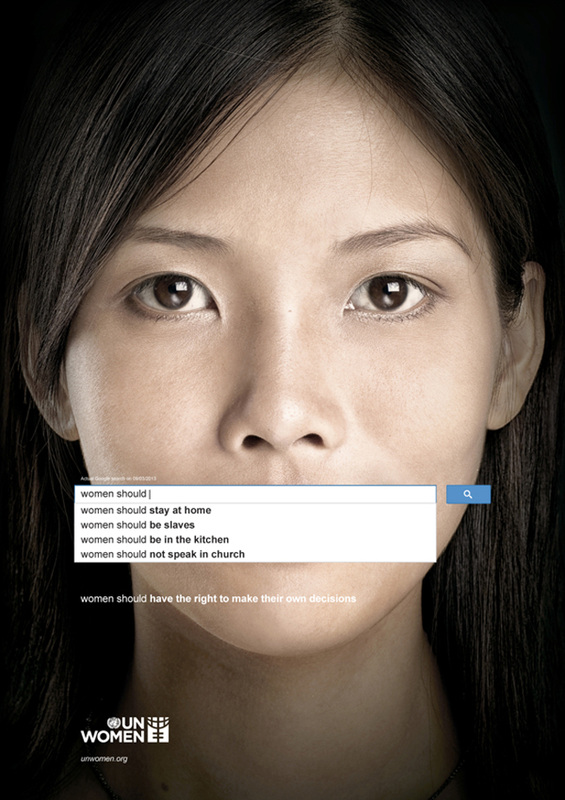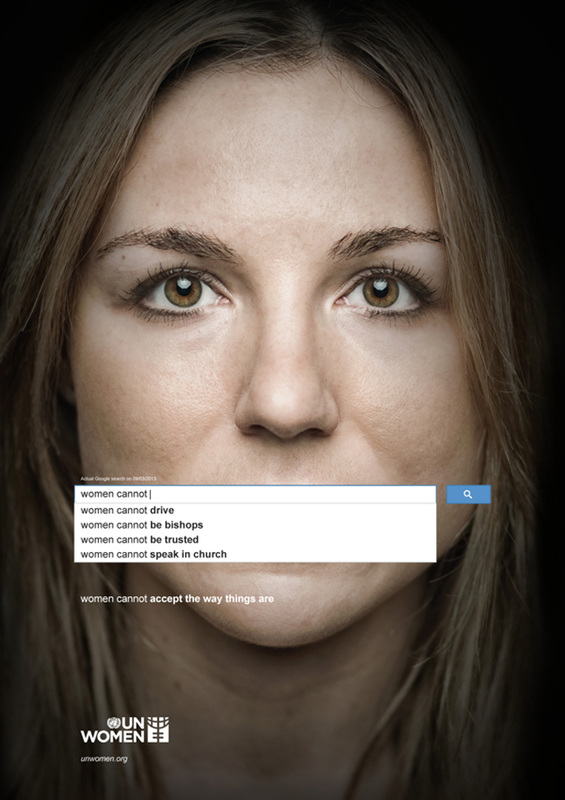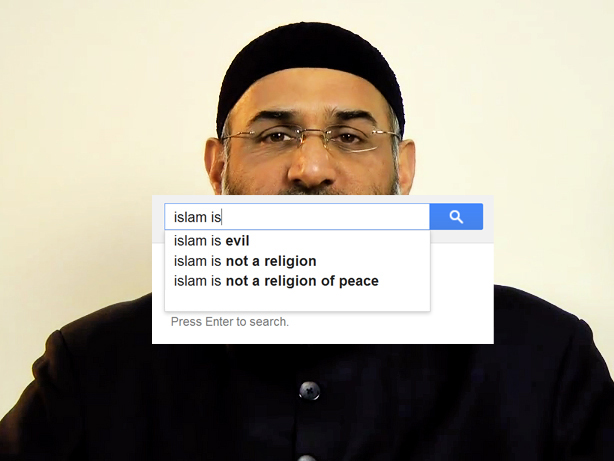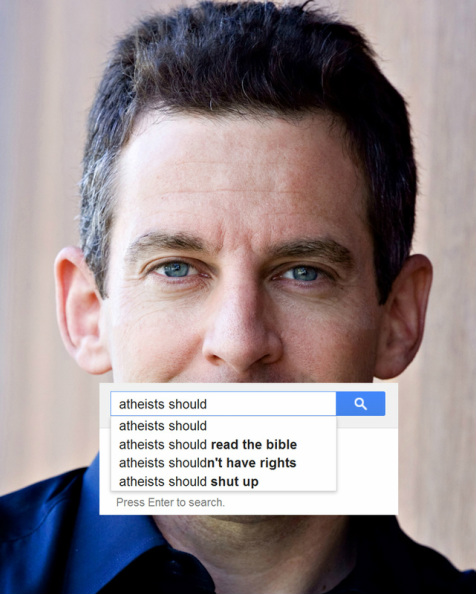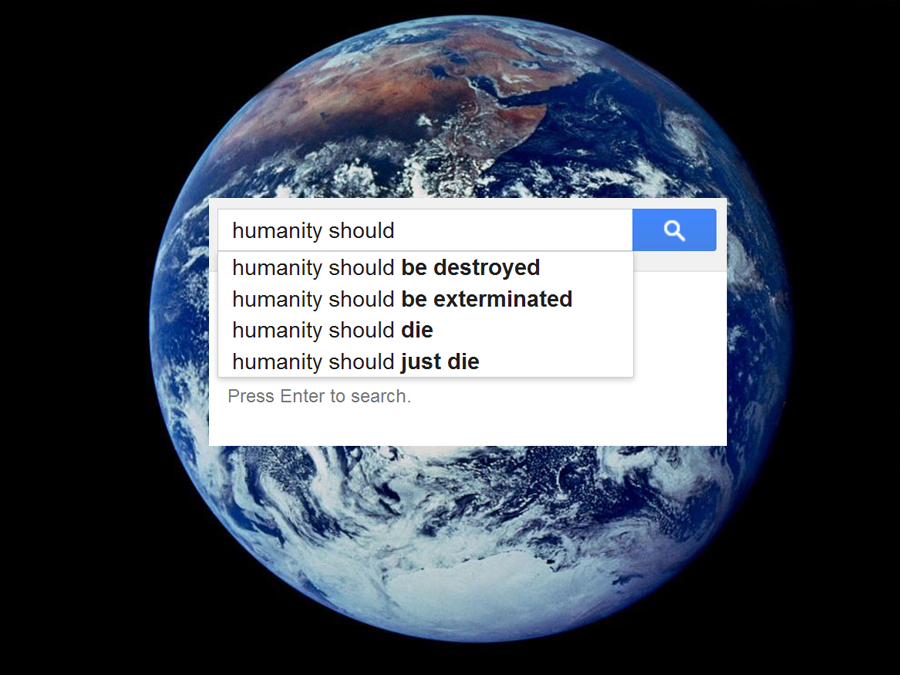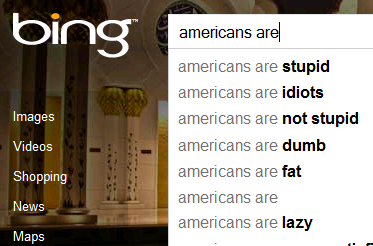|
The Breadcrumbs widget will appear here on the published site.
Word TroubleUN Women—the department of the United Nations “dedicated to gender equality and the empowerment of women”—has released a new ad campaign that is getting international praise for its supposed ingenuity and revelatory results. The campaign consists entirely of images of womens' faces with their mouths covered by a Google search bar and its automatic suggestions for completion. As you can see, the results are bad news: I immediately dismissed the value of the campaign for (what I thought were) obvious reasons, but it has since become a feminist and mainstream media story du jour. It was at this time I started mentioning the phenomenon to others in conversation, and realized that because Google auto-fills the most common searches, it is indeed being widely perceived as evidence of the world's all-pervasive, hardcore misogyny. As someone who identifies as a male feminist, allow me to politely disagree. There are two primary assertions that this campaign rests the entirety of its argument/proposition on: 1) People type exactly what they believe into Google search bars. 2) Top results therefore reveal what significant portions of people believe. Let us take these two assertions for granted first, and see what we might learn about the world: It's Worse Than We Thought(?) As a man, I don't seem to be fairing that much better... The situation looks dire for people of most religions as well... But don't think that lacking religion will save you from the world's hatred... In fact, if you're a human in general, most other humans hate you. I could go on and on, but you can experiment for yourself. Spoiler alert: It all looks awful. The top result for “straight people should," for instance, brings up “straight people should die.” Google has actually disabled the top auto-fill results for phrases like “white people are” that contain obvious racial prejudice, but rest assured, they are all terrible, regardless of what search engine you use: Firstly, I think it should be clear to people, upon reflection, that these offensive auto-fills do not represent majority opinions. The top result for the term “women should” at the time I'm writing this is “women should not speak in church." With more than a dozen national polls reporting that only 35%-45% of Americans even attend church services, it's safe to say that this particular view is not a majority one. (Why would people who don't even attend church care who speaks there, much less go out of their way to search specific, related phrases?)
Add to this the fact that the majority of Christian denominations in the U.S.—Episcopals, Mennonites, Methodists, Presbyterians, etc.—permit women to serve as ordained ministers in one capacity or another, and we begin just wonder just how widespread this belief could really be that it is the most common search. And is there really anyone who would suggest that the majority of Internet users believe that humanity should be destroyed? Or that the Internet is comprised primarily of non-straight people who believe that straight people should die? Surely not. The Wrong Way Round I must confess: These results are all the fault of myself and people like me. I have personally searched the phrase, “women should not speak in church." Not because I believe it to be true, but because I couldn't remember the book, chapter and verse of the Bible that addressed this question. I conducted the search because I wanted to understand why a relatively small minority of people believe it to be true. Google searches are not votes of belief. If they were, I would be a horrible, horrible person. I have queried arguments supporting anorexia, torture, conspiracy theories, pseudoscience, rape and all other manner of terrible things. You don't Google the obvious, or that which you think you understand; you Google what you don't understand. This can readily be seen in another example of a controversial topic: abortion. Just typing the words “abortion is” brings up a top result of “abortion is good." As someone who has worked for years with pro-choice advocates and activists and talked to hundreds of people about the issue, I can assure the reader that I have never heard someone who believes in a woman's right to choose say “abortion is good." Pro-choice people do not believe that abortion is inherently “good”; they believe that it is a decision to be made by the individual who is considering whether to have one. No pro-choice activist would type “abortion is good” into Google because that is her belief. But you know who might search that phrase? An anti-choice individual trying to dig up details on what their conception of a pro-choice argument is. Or possibly a young person who hasn't been exposed to the ideas and arguments enough to understand them. Either way, the presence of the search is not a vote of belief. Don't Forget the Trolls Keep in mind that Google searches use algorithms that alter those auto-fill results depending on what happens to be trending. If a story about transgender hate crimes or eating disorders or racism in the classroom becomes big news, count on auto-fills shifting to reflect that. And we all know that sad stories sell. If it bleeds it leads, while polarization and controversy generates page views (and therefore ad revenue). But sometimes organized groups are able to manipulate the searches anyway. The most notable of these is 4chan's notorious /b/ group, which has wreaked havoc on senses of decency since its inception. On July 10, 2008, a group of users from /b/ managed to push a unicode swastika (卐) into Google's hot trend list. Just because. The electronic universe does not consist of isolated individuals, and we should not forget how much can be done with a macro program, a few dozen workstations and a dark sense of humor on the web. Why Does This Even Matter? To be clear, I am not suggesting to you that misogyny isn't a mainstay of our cultural landscape. It is a real thing, and it sucks. But the UN Women campaign is unfortunate for a number of reasons: • It makes claims that are not true. Factually accurate understandings of our sociopolicial and cultural contexts are integral to actually being able to change the world in such a way that things are better. • It sets unrealistic standards for success. As students continue to type in “women should not vote” for school research papers on the suffragist movement in the future, results like these will continue to be present, and if we think that means something it doesn't, we have lost our place in the world of rational discourse about our own progress. • It shifts focus from current issues that matter more. If we assume that our primary problems are that women “cannot drive” as well as men or “cannot be bishops” (again, the top two results for “women cannot”), we do a profound disservice to the women who are actually suffering from sexism in this country. Globally, we make ourselves a laughing stock. Tell a woman from an Islamic theocracy about such Google search word injustices, then listen to her explain how someone was probably trying to research countries like hers in which women literally can't drive by religious edict. Or listen to her explain to the privileged feminist searching “women should be in the kitchen” as part of her college paper how she has no choice but to be in the kitchen every night. (Or, you know, how her relative was either imprisoned, flogged or stoned to death by her own family members for being raped.) There is far too much real world progress to be made in the fight against patriarchy around the world to waste our time on false assumptions. While I respect UN Women for their work, I also feel that women (and everyone else) deserve better than to be talked down to this way, and hope that their future brings creative work that speaks truth to power, rather than misrepresentations to people who already agree with them. Comments10/23/2013 01:53:12 pm
Thanks for writing this up. Lovely additional campaign posters...
Josephine Goebbels
10/24/2013 10:21:06 am
Thanks for taking the time to write this out thoughtfully and clearly. While I agree misogyny exists, so does misandry and all genders are oppressed by gender roles and further men are not responsible for some sort of conspiracy to enslave and oppress women. I believe your opinion piece here does make an excellent point that this creates an unattainable standard for success or goal. Which I actually think is part of the point. If the battle is won, then all of the people who benefit from the polarization and political exploits that appeal to the majority vote and disposable income holders. If we could realistically solve discrimination against women, men, trans, Lesbian, Gay, Bi, Queer or any other person, then these leaders would be out of jobs. Is it not in their best interest to keep polarizing people instead of searching for attainable goals or perhaps even be willing to have a real conversation on the matters that isn't all hyperbole and emotion based rhetoric? If you ask me, women in America and the UK already have equality and in many cases have advantage over men. I'm not going to bother arguing the pay gap or rape statistics with a feminist as I am sure you've read the counterarguments to those central points of feminist ideology and no doubt have ignored or refused to believe them seeing as you're still a feminist. I'd be much happier in a world that coveted egalitarianism and humanism over what has now become an advantage movement usurped by radicals and political figures looking for career advancement. Comments are closed.
|
|

